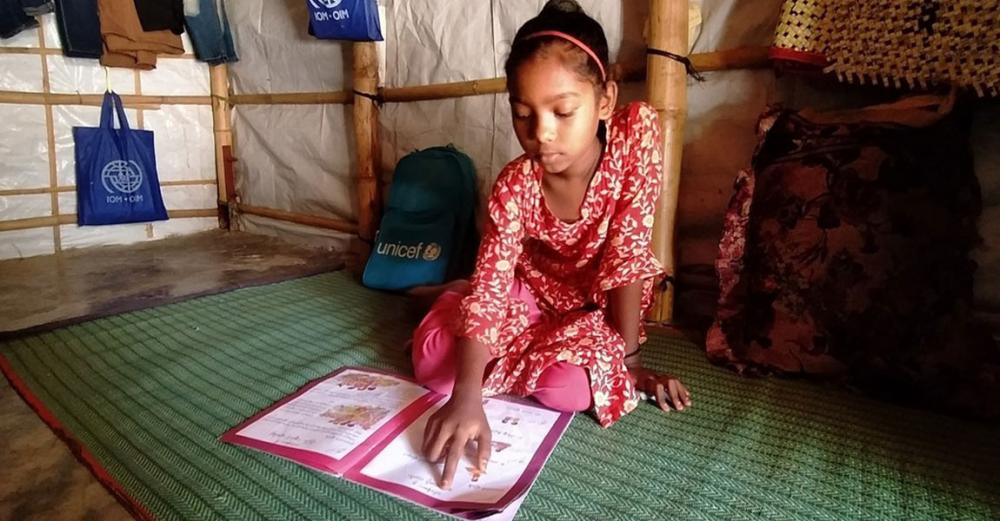Just Earth News | @justearthnews | 04 Sep 2020

A nine-year-old studies at her shelter in a Rohingya refugee camp in southern Bangladesh. She is supported by her mother and teacher, as the education centre at the camp is closed due to COVID : UNICEF/UNI340770
New York: While children in every country have struggled with the impact of COVID-19 on their education, refugee children have been particularly disadvantaged, the UN refugee agency (UNHCR) has said, amid fears many may not be able to resume their studies due to school closures, high fees or lack of access to technology to learn remotely.
UNHCR report, Coming Together for Refugee Education, released on Thursday, predicts that unless the international community takes immediate and bold steps against the catastrophic effects of COVID-19 on refugee education, the potential of millions of young refugees living in some of the world’s most vulnerable communities will be further threatened.
“After everything they have endured, we cannot rob them of their futures by denying them an education today,” Filippo Grandi, UN High Commissioner for Refugees, said in a news release announcing the findings.
“Despite the enormous challenges posed by the pandemic, with greater international support to refugees and their host communities, we can expand innovative ways to protect the critical gains made in refugee education over the past years,” he added.
The report, based on 2019 data from twelve countries hosting more than half of the world’s refugee children, also showed that while there is 77 per cent gross enrolment at the primary school level, the figure drops to 31 per cent in secondary and only 3 per cent at high-school levels.
Far behind global averages, these statistics nevertheless do represent progress: enrolment in secondary education rose, with tens of thousands of refugee children newly attending school – a 2 per cent increase in 2019 alone.
However, the COVID-19 pandemic now threatens to undo this and other crucial advances, including efforts to achieve Sustainable Development Goal 4 of ensuring inclusive and equitable quality education for all.
Threat particularly grave for refugee girls
According to UNHCR, for refugee girls – who already have less access to education than boys and are half as likely to be enrolled in school by the time they reach secondary level – the threat is particularly grave.
Based on UNHCR data, the Malala Fund has estimated that as a result of COVID-19, half of all refugee girls in secondary school will not return when classrooms reopen this month. For countries where refugee girls’ gross secondary enrolment was already less than 10 per cent, all girls are at risk of dropping out for good, a chilling prediction that would have an impact for generations to come.
“Not only is education a human right, but the protection and economic benefits to refugee girls, their families, and their communities of education are clear. The international community simply cannot afford to fail to provide them with the opportunities that come through education,” said Mr. Grandi.
Working as one to give children a chance
Ensuring quality education today means less poverty and suffering tomorrow – Mo Salah, UNHCR Ambassador
In a powerful final word to the report, the Vodafone Foundation and UNHCR Ambassador for the Instant Network Schools Programme, and global football star, Mohamed Salah, said: “Ensuring quality education today means less poverty and suffering tomorrow.”
He called on everyone to “work as a team.”
“Unless everyone plays their part, generations of children – millions of them in some of the world’s poorest regions – will face a bleak future. But if we work as a team, as one, we can give them the chance they deserve to have a dignified future. Let’s not miss this opportunity,” added Mr. Salah.
The report calls on governments, the private sector, civil society and other key stakeholders to join forces to find solutions which strengthen national education systems and link with pathways towards certified education, and to secure and safeguard education financing.
Without such action, the report warns, we risk a lost generation of refugee children deprived of their education.